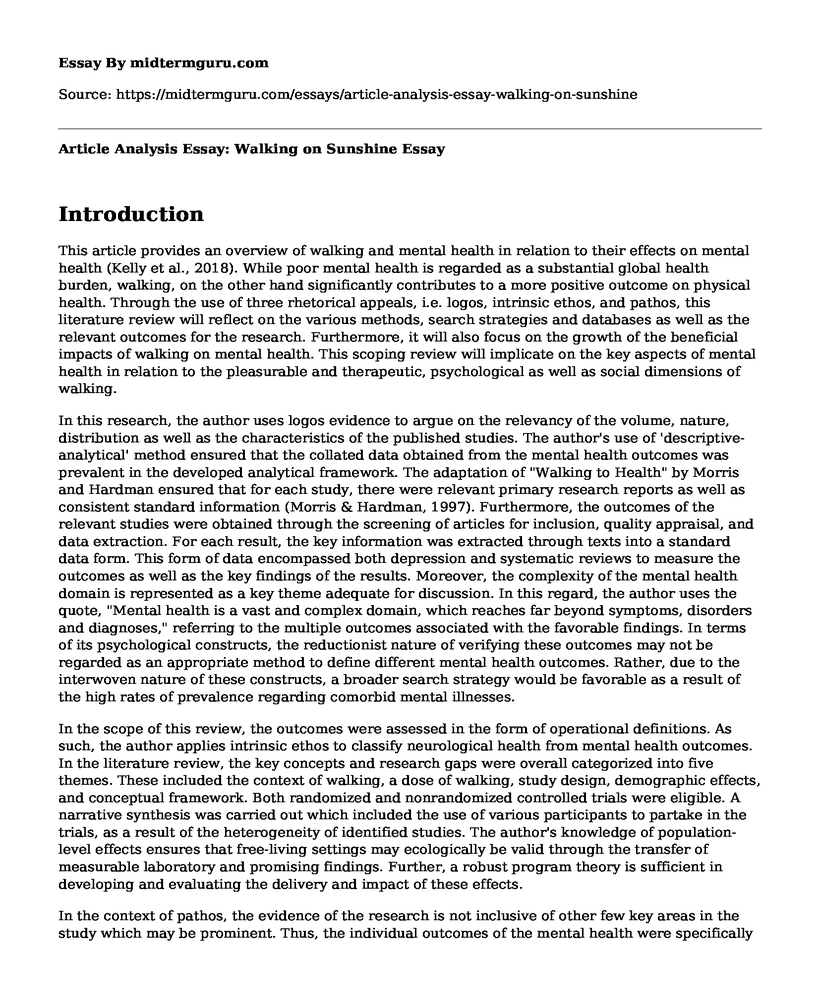Introduction
This article provides an overview of walking and mental health in relation to their effects on mental health (Kelly et al., 2018). While poor mental health is regarded as a substantial global health burden, walking, on the other hand significantly contributes to a more positive outcome on physical health. Through the use of three rhetorical appeals, i.e. logos, intrinsic ethos, and pathos, this literature review will reflect on the various methods, search strategies and databases as well as the relevant outcomes for the research. Furthermore, it will also focus on the growth of the beneficial impacts of walking on mental health. This scoping review will implicate on the key aspects of mental health in relation to the pleasurable and therapeutic, psychological as well as social dimensions of walking.
In this research, the author uses logos evidence to argue on the relevancy of the volume, nature, distribution as well as the characteristics of the published studies. The author's use of 'descriptive-analytical' method ensured that the collated data obtained from the mental health outcomes was prevalent in the developed analytical framework. The adaptation of "Walking to Health" by Morris and Hardman ensured that for each study, there were relevant primary research reports as well as consistent standard information (Morris & Hardman, 1997). Furthermore, the outcomes of the relevant studies were obtained through the screening of articles for inclusion, quality appraisal, and data extraction. For each result, the key information was extracted through texts into a standard data form. This form of data encompassed both depression and systematic reviews to measure the outcomes as well as the key findings of the results. Moreover, the complexity of the mental health domain is represented as a key theme adequate for discussion. In this regard, the author uses the quote, "Mental health is a vast and complex domain, which reaches far beyond symptoms, disorders and diagnoses," referring to the multiple outcomes associated with the favorable findings. In terms of its psychological constructs, the reductionist nature of verifying these outcomes may not be regarded as an appropriate method to define different mental health outcomes. Rather, due to the interwoven nature of these constructs, a broader search strategy would be favorable as a result of the high rates of prevalence regarding comorbid mental illnesses.
In the scope of this review, the outcomes were assessed in the form of operational definitions. As such, the author applies intrinsic ethos to classify neurological health from mental health outcomes. In the literature review, the key concepts and research gaps were overall categorized into five themes. These included the context of walking, a dose of walking, study design, demographic effects, and conceptual framework. Both randomized and nonrandomized controlled trials were eligible. A narrative synthesis was carried out which included the use of various participants to partake in the trials, as a result of the heterogeneity of identified studies. The author's knowledge of population-level effects ensures that free-living settings may ecologically be valid through the transfer of measurable laboratory and promising findings. Further, a robust program theory is sufficient in developing and evaluating the delivery and impact of these effects.
In the context of pathos, the evidence of the research is not inclusive of other few key areas in the study which may be prominent. Thus, the individual outcomes of the mental health were specifically but not inclusive of physiological responses, cardiovascular disease, and all cause-mortality. The author's question regarding the mental of walking in mental health possesses a strong recommendation on enhancing the quality and volume of intervention and prospective studies. Hence, the implementation of each mental health outcome can only be addressed in terms of the policy and practice required for the discussion regarding the efficiency of the current evidence base. In the recent new findings, the evidence base indicates that the additional benefits of mental health outcomes may relate to walking outdoors, especially in natural environments, in comparison to indoor, treadmill-based walking (Sugiyama et al., 2008). On the contrary, the research conducted was based mostly on negative disease-based outcomes including anxiety and depression, rather than positive well-being outcomes such as subjective well-being.
Conclusion
Despite the relevant outcomes, the study was not inclusive of various variables such as dementia, cognitive function, mood and HRQoL. However, both prevention and intervention effects were deployed in an attempt to provide a wide range of mental health outcomes in relation to walking. As such, due to this limitation, a large volume of literature was excluded thus substantially contributing to a health burden. On the contrary, the warranty of the research was based more on the relevant outcomes of walking thus facilitating the overall process of the research.
References
Kelly, P., Williamson, C., Niven, A. G., Hunter, R., Mutrie, N., & Richards, J. (2018). Walking on sunshine: scoping review of the evidence for walking and mental health. Br J Sports Med, 52(12), 800-806.
Morris, J. N., & Hardman, A. E. (1997). Walking to health. Sports medicine, 23(5), 306-332.
Sugiyama, T., Leslie, E., Giles-Corti, B., & Owen, N. (2008). Associations of neighborhood greenness with physical and mental health: do walking, social coherence and local social interaction explain the relationships? Journal of Epidemiology & Community Health, 62(5), e9-e9.
Cite this page
Article Analysis Essay: Walking on Sunshine. (2022, Sep 17). Retrieved from https://midtermguru.com/essays/article-analysis-essay-walking-on-sunshine
If you are the original author of this essay and no longer wish to have it published on the midtermguru.com website, please click below to request its removal:
- Articles Analysis Essay on Animal Behavior
- Paper Example on Strategic Family Therapy
- Paper Example on Crisis and Trauma Counseling
- Theory of Love: Intimacy, Passion & Commitment Explored - Essay Sample
- Female Sexual Disorders - Essay Sample
- Personality: Neuroticism & Biblical Character - Essay Sample
- Movie Analysis Essay on Memory of My Face







